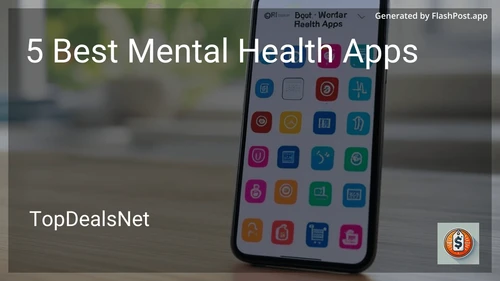Best Mental Health Applications in February 2026

Headspace
- Guided meditation sessions
- Sleep aids and bedtime sounds
- Mindfulness exercises
- Courses for stress and anxiety management
- Partnered workouts and yoga

Calm
- Meditation and breathing exercises
- Sleep stories narrated by celebrities
- Music and soundscapes for relaxation
- Guided video lessons on mindful movement
- Daily Calm meditation series

BetterHelp
- Access to licensed therapists and counselors
- Secure and private communication
- Therapy via messaging, video, or phone calls
- Journaling tools and worksheets
- Personalized therapy plans

Moodfit
- Mood tracking and goal setting
- Daily gratitude journaling
- Cognitive Behavioral Therapy (CBT) exercises
- Personalized mental health reports
- Guided audio meditations

Woebot
- AI-driven mental health chatbot
- Cognitive Behavioral Therapy (CBT) techniques
- Real-time emotional check-ins
- Skill-building through short exercises
- Progress tracking and journaling
In today’s fast-paced world, taking care of our mental health has become increasingly important. With the advent of technology, mental health applications have emerged as a convenient and accessible resource for individuals seeking support. This guide provides an overview of mental health apps and helps you choose the right one based on your personal needs.
Understanding Mental Health Apps
Mental health apps are digital tools designed to enhance emotional well-being and provide support for various mental health conditions. These applications offer a range of features, from mindfulness exercises and mood tracking to cognitive behavioral therapy (CBT) techniques and virtual counseling. They are available on most smartphones and tablets, making mental health resources accessible anytime and anywhere.
Features to Look For
When searching for a mental health app, consider the following features to ensure it meets your specific needs:
User-Friendly Interface
An intuitive and easy-to-navigate interface is crucial for effective app usage. Look for apps that are visually appealing, well-structured, and require minimal effort to understand.
Customization and Personalization
The best apps offer personalized experiences based on your preferences and mental health journey. Whether it’s setting goals, tracking moods, or receiving personalized content, customization can enhance engagement and outcomes.
Evidence-Based Practices
Ensure the app incorporates evidence-based practices and therapeutic techniques. Look for apps developed or endorsed by mental health professionals or institutions, as these are more likely to offer reliable and effective support.
Privacy and Security
Given the sensitive nature of mental health information, privacy and security are paramount. Check the app’s privacy policy to ensure your data is protected and not shared without consent.
Accessibility and Support
Consider apps that offer multiple accessibility features such as text-to-speech, transcription, or support for various languages. Additionally, apps with responsive customer support can address technical issues or provide guidance.
Evaluating Your Needs
Before choosing a mental health app, it is important to assess your own needs and goals:
Define Your Objectives
Are you looking to manage stress, improve sleep, develop mindfulness, or address a specific mental health condition? Clarity on your objectives will help you narrow down suitable apps.
Consider Your Lifestyle
Choose an app that fits seamlessly into your lifestyle. Whether you prefer short daily exercises or need comprehensive therapy sessions, ensure the app complements your routine.
Determine Your Budget
While many mental health apps offer free features, premium versions with additional resources are often available for a subscription fee. Define your budget to make informed choices.
Reading Reviews and Ratings
Reviews and user ratings can provide valuable insights into an app’s effectiveness and user satisfaction. Look for apps with consistent positive feedback and take note of any criticisms or limitations mentioned by users.
Consulting with Professionals
If you are grappling with a specific mental health issue, consider consulting with a mental health professional. They can recommend apps that complement your treatment plan or provide additional support in your mental wellness journey.
Conclusion
Selecting the right mental health app requires careful consideration of your personal needs, app features, and overall effectiveness. With the right app, technology can play a key role in supporting your mental health journey, fostering resilience, and promoting overall well-being. Take the time to explore different options and find the app that best aligns with your goals and lifestyle.
